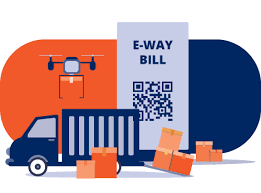E-Way Bill
The e-way bill system ensures adherence to GST regulations for transported goods and serves as a vital tool for monitoring goods movement while preventing tax evasion.
- An e-way bill is divided into two segments: Part A, completed by the individual overseeing the transport of goods with a consignment value surpassing Rs.50,000/-, and Part B (transport specifics), completed by the entity responsible for transporting the goods.
- If a registered entity, whether as the sender or receiver, is transporting the goods, they must generate the e-way bill by entering information in Part B via the GST Common Portal for the eWay bill system.
- Upon e-way bill generation, its details become accessible to the registered recipient on the shared portal. The recipient must then confirm or decline the consignment covered by the e-way bill. If no response is received within seventy-two hours of the details being accessible on the shared portal, it will be presumed that the recipient has acknowledged the information.
- The e-way bill's validity is determined by the distance the goods are to travel.
- If the journey is under 100 Km, the e-way bill remains valid for one day from its creation date.
- For each additional 100 Km, the validity extends by one day from the day of generation.
- The term “relevant date” refers to the e-way bill's creation date. Its validity starts from this moment, with each day constituting a full 24 hours.
- Typically, the e-way bill's validity cannot be prolonged.
- Yet, the Commissioner can provide an extension via an official notification, specifying certain goods categories eligible for this extension.
Section 68 of the Act stipulates that the Government can mandate individuals overseeing a vehicle transporting goods above a specified value to possess prescribed documents and tools. As per Rule 138 of the CGST Rules, 2017, the e-way bill is designated as the essential document for specified consignments. Therefore, it's imperative to have an e-way bill generated from the designated portal.

